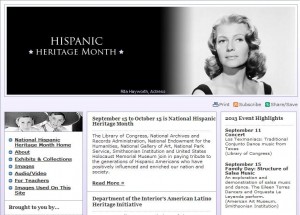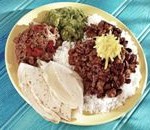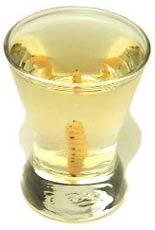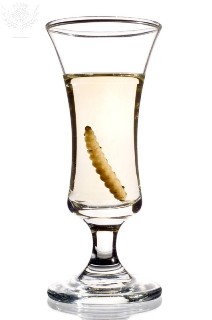Blog del Instituto Cervantes de Dublín
Torre Martello
Hispanic Heritage Month Celebrations / Celebraciones del Mes de la Herencia Hispánica
 Each year, Americans observe National Hispanic Heritage Month from September 15 to October 15, by “celebrating the histories, cultures and contributions of American citizens whose ancestors came from Spain, Mexico, the Caribbean and Central and South America”.
Each year, Americans observe National Hispanic Heritage Month from September 15 to October 15, by “celebrating the histories, cultures and contributions of American citizens whose ancestors came from Spain, Mexico, the Caribbean and Central and South America”.
As the Library of Congress recognises, “it seems a bit strange that in contrast to all the other “heritage” celebrations and recognitions, the one for Hispanic Americans starts in the middle of the month”. But there are good reasons indeed for that selection.
Happy Hispanic Heritage Month!
Cada año, en Estados Unidos se celebra el Mes Nacional de la Herencia Hispánica desde el 15 de septiembre hasta el 15 de octubre, conmemorando las historias, las culturas y las contribuciones de los ciudadanos norteamericanos de ascendencia española, mexicana, caribeña, centroamericana y suramericana.
Como explica el blog de la Biblioteca del Congreso de los Estados Unidos, parace un poco extraño, en contraste con otras celebraciones y reconocimientos, que la de los hispanoamericanos comience a mediados de mes. sin embargo, hay buenas razones para esta elección.
¡A celebrar pues! ¡Feliz Mes de la Herencia Hispánica!
Charla y degustación: Cocina mexicana y tequila | Talk and tasting: Mexican Cuisine and Tequila
Esta tarde tenemos un suculento programa doble en colaboración con la Embajada de México en Irlanda. A partir de las 17:30, el Café Literario abre sus puertas con una charla en español a cargo de Claudio Laredo que llevar por título: Cocina mexicana: riqueza, colorido y variedad.
17:30, el Café Literario abre sus puertas con una charla en español a cargo de Claudio Laredo que llevar por título: Cocina mexicana: riqueza, colorido y variedad.
A las 18:30 será José Torres Díaz el encargado de deleitarnos con los secretos de una de las bebidas mexicanas más representativas: el tequila. Esta charla será en español y en inglés.
No solo tendrás la oportunidad de ampliar tus conocimientos teóricos sobre la materia sino que además podrás degustar los exquisitos sabores de México. ¡No te lo puedes perder!
 This evening we have a succulent double programme in cooperation with the Embassy of Mexico in Ireland. Café Literario will open its doors at 5.30pm with a talk in Spanish with Claudio Laredo. The name of this event is Mexican Cuisine: unique variety, colour and richness.
This evening we have a succulent double programme in cooperation with the Embassy of Mexico in Ireland. Café Literario will open its doors at 5.30pm with a talk in Spanish with Claudio Laredo. The name of this event is Mexican Cuisine: unique variety, colour and richness.
At 6.30pm José Torres Díaz will be in charge of a talk about one of the most representative spirits of Mexico: Tequila. This talk will be in Spanish and in English.
Not only will you have the chance of widening your theory but you also will be able to try the delicious tastes of Mexico. You cannot miss it!
Taller bebidas mexicanas: El mezcal | Mexican Spirits Workshop: Mezcal
 Hoy, a partir de las seis de la tarde, podrás participar en un taller sobre las bebidas mexicanas, más concretamente sobre el Mezcal, y su degustación. No olvides hacer tu reserva en reservas.dublin@cervantes.es.
Hoy, a partir de las seis de la tarde, podrás participar en un taller sobre las bebidas mexicanas, más concretamente sobre el Mezcal, y su degustación. No olvides hacer tu reserva en reservas.dublin@cervantes.es.
Desde 1998, la Asociación Pro Cultura Mezcal A.C., investiga, estudia y difunde la cultura del mezcal, un ancestro venerable de la gastronomía mexicana y una de las formas más puras de alcohol que existen en el mundo para el consumo humano.
El propósito de este taller es: cata y formación.
Cata: Mezcal blanco.
Formación: Cómo beber mezcal.
Dicen los expertos que el mezcal es afrodisíaco, una bebida mística, mágica y asombrosa, que si se ingiere con mesura, es una bebida que estimula, que ahuyenta la negatividad, hace crecer la imaginación, hace olvidar los resentimientos, acompaña en la soledad y que ayuda a ver el mundo simplemente como un lugar mejor.
Esta tarde, esperamos poder conocer uno de los secretos mejor guardados de la gastronomía mexicana.
 Do you want to know more about Mezcal, one of the traditional spirits from Mexico? You can participate in a workshop about this drink today at 6pm at Café Literario. Don´t forget to make your reservation: reservas.dublin@cervantes.es
Do you want to know more about Mezcal, one of the traditional spirits from Mexico? You can participate in a workshop about this drink today at 6pm at Café Literario. Don´t forget to make your reservation: reservas.dublin@cervantes.es
Since 1998, The Association for Mezcal Culture, A.C, has been studying, researching and promoting the culture of a venerable ancestor of the Mexican gastronomy, mescal, one of the purest forms of alcohol that exists in the world for human consumption.
The purpose of this workshop is: Tasting and educating.
Tasting: Silver Mezcal
Educating: How to Drink Mezcal
Experts say mezcal is a mystic, magic aphrodisiac and an extraordinary drink. When drunk with measure, it wakes the spirit, tames enmity, stimulates imagination, clears resentments, accompanies solitude, and makes the world seem just… a little better.
We look forward to know better one of the best kept secrets of the Mexican gastronomy.
El día E en la biblioteca / El Día E in the library
 Quedan veinticuatro horas para que de comienzo El día E, la fiesta de todos los que hablamos español. Ese día, mañana, la biblioteca estará abierta en su horario habitual los sábados, de 9:30 a 14:00.
Quedan veinticuatro horas para que de comienzo El día E, la fiesta de todos los que hablamos español. Ese día, mañana, la biblioteca estará abierta en su horario habitual los sábados, de 9:30 a 14:00.
Sin embargo, a partir de las 15:30 volverá a abrir hasta las 17:00 con un bazar de libros en el que ofreceremos libros completamente nuevos a muy buenos precios. Todos ellos en español y, casi todos ellos, de literatura española e hispanoamericana. Puedes llevarte un libro por 5 euros o ¡3 libros por diez euros!
Además, a los que vengáis a la biblioteca entre las 15:30 y las 17:00 os ofreceremos el carné de la biblioteca completamente gratis por seis meses. ¡Solo a los que vengáis durante esa hora y media!
¿Y qué más? A lo largo del día, en nuestro café literario y en nuestra sala de exposiciones podrás disfrutar de un concurso de tortilla de patata, de la buena comida española y latinoamericana, de una fiesta latina, o de clases gratuitas de español y de tango. ¿Se nos olvida algo? Por si acaso, aquí tienes el programa completo.
Just Twenty-four hours left to ElDíaE, la fiesta de todos los que hablamos español. That day, tomorrow, the library will be open as usual on Saturdays from 9:30 to 14:00.
However, we will re-open at 15:30 until 17:00 with a market of books which offer brand new books at great prices. All of them in Spanish and almost all of them, Spanish and Latin American literature. You can take a book for 5 Euros or 3 books for ten euros!
In addition, for those who visit the library between 15:30 and 17:00 we will offer the library membership card free for six months. Only for those coming during that hour and a half!
And what else? Throughout the day, in our Café Literario and in our showroom, you can enjoy an Spanish omelette competition, good Spanish and Latin American food, a Latin fiesta, or free Spanish classes and tango workshop. Did we forget something? Just in case, here’s the whole programme..
La cocina mexicana / Mexican cuisine y Claudio Hall Van Beuren en el Instituto Cervantes de Dublín
En nuestros “Encuentros en la biblioteca“, viajamos de nuevo hasta México y nos detenemos a disfrutar de su cultura gastronómica de la mano de Claudio Hall Van Beuren.
Claudio nos habla de la historia de la famosa fonda El Refugio, el primer restaurante de comida tradicional mexicana en México, un lugar vanguardista con recetas tradicionales. Tenemos que remontarnos a los años 50, más exactamente a 1954 para encontrar el origen de El Refugio. Una bonita historia de la que fueron protagonistas los abuelos de Claudio Hall Van Beuren. Sus descendientes, después, generación tras generación, han ido cuidando meticulosamente su herencia para transformar El Refugio en lo que ahora es, uno de los más destacados lugares de la gastronomía mexicana.
Bien conocida es de todos la gastronomía del país azteca. Sin embargo, Claudio nos señala que existen muchos estereotipos respecto a ella. “La comida va más allá de los burritos. Al ser un territorio muy amplio, existen diversas recetas” pero algunos de los ingredientes son comunes: la manteca para cocinar, el jitomate y el chile son los que destacan.
El secreto al que Hall Van Beuren apunta para el éxito de El Refugio es el de usar las técnicas tradicionales e ingredientes frescos. Pero la comida tiene que ir acompañada siempre del amor y la atención al detalle. Todo en su conjunto hace que podamos degustar allí, por ejemplo, las mejores albóndigas en salsa de chile chipotle.
Una buena oportunidad más de profundizar en la colorida cultura de este país, con unas tradiciones siempre sorprendentes. Una magnífica ocasión para conocer un lugar idóneo para disfrutar de la buena mesa.
A new edition of our Meetings at the Library drives us to Mexico where we will stop to to enjoy the gastronomic culture with the guidance of Claudio Hall Van Beuren.
Claudio tells the story of the famous inn El Refugio, the first traditional Mexican food restaurant in Mexico. We have to go back to the 50s, more precisely to 1954 to find the origin of El Refugio. A nice story starred by Claudio’s grandparents . Their descendants, generation after generation, have been carefully watching their heritage to transform El Refugio in what is now: one of the most prominent places of Mexican cuisine.
Is well known of all the food of the Aztec country. However, Claudio tells us that there are many stereotypes about it. “The food goes beyond burritos. As a very large territory, there are a wide variety of recipes but some of the ingredients are common: cooking butter, jitomate, chile…”
The secret to which Van Beuren Hall points to the success of El Refugio is using traditional techniques and fresh ingredients. But the food must always be accompanied by love and attention to detail. All together we can taste it there, for example, the best meatballs in chipotle chile sauce.
A good opportunity to delve into the colorful culture of this country, into his traditions. A great opportunity to learn a great place to enjoy good food.
Mezcal: el alcohol más perfecto / the most perfect alcohol
Sergio Inurrigarro, presidente de la Asociación Promezcal, tuvo la amabilidad de sumarse a nuestros Encuentros en la Biblioteca para introducirnos en el interesante mundo del mezcal, uno de los secretos mejor guardados de la tradición culinaria mexicana que sin embargo está considerado nada menos que el alcohol más perfecto del mundo para la ingesta humana. Sergio Inurrigarro nos explica las razones, además de hacer un recorrido por su historia, propiedades y técnica de degustación.
El mezcal es fruto de la planta del ágave y, además, del mestizaje entre el viejo y el nuevo mundo. Entre otras curiosidades históricas, Inurrigarro relata cómo el mezcal era utilizado por los conquistadores españoles como reclamo para hacer a los indígenas exprimir el oro y la plata de las minas.
Esta bebida “mística, mágica y afrodisíaca” no puede tomarse a la ligera, sino que precisa de una técnica específica para su correcta degustación, la llamada “Técnica de la cata del beso”, explica Inurrigarro. Solo así se aseguran sus infinitas propiedades, entre las que se encuentran, citando al escritor mexicano Andrés Henestrosa, la de despertar el espíritu y hacer que el mundo se vea mucho mejor.
Los Encuentros en la Biblioteca son una serie de entrevistas a personalidades del mundo de las letras y la cultura en general que se realizan en la biblioteca del Instituto Cervantes de Dublín. Esta iniciativa nació con el propósito de servir de plataforma de encuentro entre escritores y lectores y de contribuir a nuestra misión de difusión de la cultura en español.
Sergio Inurrigarro, President of the Association Pro-Mezcal, was so kind to join our Meetings at the library to introduce us the interesting world of mezcal, which is one of the best kept secrets of Mexican gastronomy. The mezcal is however considered the most perfect alcohol for human intake. In this video Sergio Inurrigarro explains the reasons, as well as making a journey over the history, benefits and tasting techniques.
Mezcal comes from the agave plant as well as from the fusion of the Old and the New World. Among other historic curiosities, Inurrigarro recounts how the Spanish conquerors used the mezcal to attract the indigenous population to mine gold and silver for them.
This “mystic, magical and aphrodisiac” drink cannot be taken lightly. On the contrary, a very specific technique called “Kiss tasting technique” must be applied for tasting, explains Inurrigarro. Only by doing this we can preserve its many benefits, such as those referred by Mexican writer Andrés Henestrosa: awakening the spirit and making people perceive the world much better.
Meetings at the library is the title of a series of interviews with important figures in literature and the arts in general held at the Library of Instituto Cervantes Dublin. This initiative was conceived with the aim to serve as a meeting point between writers and readers and to contribute to our mission of disseminating the culture in Spanish.
Mezcal, el agüita que hace hablar / the water that makes you talk
 Existe un refrán popular mexicano que dice: “para todo mal mezcal y para todo bien… ¡también!”. La cultura popular es sabia. Esta tarde, te invitamos a conocer un poco mejor esa cultura a través de una de las bebidas con más secretos y tradición de la gastronomía mexicana: el mezcal.
Existe un refrán popular mexicano que dice: “para todo mal mezcal y para todo bien… ¡también!”. La cultura popular es sabia. Esta tarde, te invitamos a conocer un poco mejor esa cultura a través de una de las bebidas con más secretos y tradición de la gastronomía mexicana: el mezcal.
El mezcal tiene su origen como bebida sagrada en la antigüedad mexicana. Una bebida que solo podían ingerir los sacerdotes y los ancianos en ocasiones especiales. Los españoles importaron posteriormente el proceso de destilación que habían aprendido de los árabes. Del mestizaje de estas dos culturas nace el mezcal que conocemos hoy en día.
Se dice que en México, una festividad sin mezcal es inconcebible. Hoy, en el Café Literario, nos enseñarán a beberlo. Con cata incluida, por supuesto. ¡No os demoréis, y venid a probar “el agüita que hace hablar”!
A popular Mexican saying states that “for everything bad, mezcal, and for everything good, too!”. The traditional culture is wise. This evening we invite you to know more about this culture through one of the most intriguing and traditional drinks of Mexican cuisine: mezcal.
In its origin, mezcal was considered a sacred drink in Mexican ancient times. Only priests and old people were allowed to drink it in special occasions. Later on, the Spanish imported the distillation process that they had learned from the Arabs. The mezcal as we know it today emerged from the mix of these two cultures.
In Mexico, the mezcal is a must in every festivity. Today, in Café Literario we will learn how to drink it. Of course, a testing is included. Harry up! Come and taste “the water that makes you talk”!
¿A qué sabe México? / How does Mexico taste?
Si preguntamos a cualquier viandante de la ciudad de Dublín a qué sabe México, seguro no vacilará mucho en dar una respuesta: frijoles, burritos, chile, mole, tequila, guacamole… No es de extrañar el alto grado de internacionalización que ha alcanzado la cocina mexicana a juzgar por su colorido, la dilatada variedad de platos y sabores y la peculiaridad de sus ingredientes, fruto de la fusión de elementos del Viejo y el Nuevo Mundo.
Pero esa larga lista de productos y platos que nos vienen a la cabeza es tan solo la punta del iceberg, como pondrá de manifiesto A taste of Mexico 2011, un festival para celebrar y dar a conocer al público irlandés los sabores de México y que organiza la Embajada de México en colaboración, entre otras instituciones, con el Instituto Cervantes.
A taste of Mexico 2011 (19-24 de noviembre) hará un recorrido en profundidad por la cultura culinaria mexicana con un amplio programa de actividades en el que no faltarán degustaciones, talleres gastronómicos, conferencias y proyecciones de cine. A ver qué respondemos la próxima vez que nos pregunten ¿a qué sabe México?
ACTIVIDADES ORGANIZADAS EN EL INSTITUTO CERVANTES:
- La cocina mexicana: una experiencia única de sabores, colores y tradición. Conferencia. 21 de noviembre, 18h.
- La Historia, la industria y el alma del tequila. Conferencia y degustación. 22 de noviembre, 18h.
- Como agua para chocolate. Proyección de cine. 23 de noviembre, 18h.
- Bebidas mexicanas. El mezcal. Seminario. 24 de noviembre, 18h.
If we ask any Dubliner on the street ‘how does México taste?’, for sure he or she will come out with an answer right away: kidney beans, burritos, chilli, mole, tequila, guacamole… It’s not surprising that Mexican food has become so popular all over the world, given its colourful appearance, the ample variety of dishes and tastes and singular ingredients coming from both the Old and the New World.
However, as A taste of Mexico 2011 will prove, this long list of ingredients and dishes that come to our mind is just the tip of the iceberg. A taste of Mexico (November 19-24) is a festival organized by the Embassy of Mexico in collaboration with Instituto Cervantes among other institutions, with the aim of bringing Mexican flavours to the Irish people.
This festival will make a deep run through Mexican food culture with a wide program of activities including tastings, workshops, conferences and film screenings. Next time that you’ll be asked ‘how does Mexico taste?’, what will you answer?
ACTIVITIES HELD AT INSTITUTO CERVANTES:
- The Mexican cuisine. Lecture. November 21, 6pm.
- History, industry and the soul of tequila. Lecture and tasting. November 22, 6pm.
- Like Water for Chocolate. Film screening. November 23, 6pm
- Mexican Spirits. Mezcal. Seminar. November 24, 6pm.
Feliz Hispanic Heritage Month
 Todos los años se celebra en Estados Unidos el “Mes de la Herencia Hispánica” (National Heritage Month), desde el 15 de septiembre hasta el 15 de octubre.
Todos los años se celebra en Estados Unidos el “Mes de la Herencia Hispánica” (National Heritage Month), desde el 15 de septiembre hasta el 15 de octubre.
Durante ese mes se conmemoran las historias, culturas y contribuciones de los ciudadanos americanos cuyos antepasados llegaron a aquellas tierras procedentes de España, México, el Caribe y América Central y del Sur.
No en vano, Estados Unidos es el segundo país en el mundo con mayor número de hablantes de español.
el día 15 de septiembre es significativo porque ese día se celebra el aniversario de la independencia de Costa Rica, El Salvador, Guatemala, Honduras y Nicaragua. México y Chile celebran sus día de la independencia el 16 y el 18 de septiembre respectivamente.
Del mismo modo, el Día de Colón, Día de la Raza, o Día de la Hispanidad, que se celebra rl 12 de octubre, cae también en este período de 30 días.
En esta página se puede ver el programa completo de actividades.
Each year, the United States observe National Hispanic Heritage Month from September 15 to October 15, by celebrating the histories, cultures and contributions of American citizens whose ancestors came from Spain, Mexico, the Caribbean and Central and South America.
Not in vain, United States of América is the second country in the world with the largest number of Spanish speakers.
The day of September 15 is significant because it is the anniversary of independence for Latin American countries Costa Rica, El Salvador, Guatemala, Honduras and Nicaragua. In addition, Mexico and Chile celebrate their independence days on September 16 and September18, respectively. Also, Columbus Day or Día de la Raza, which is October 12, falls within this 30 day period.
In this website you can find all the activities related to this event
¿Sabes cómo beber mezcal? Do you know how to drink mezcal?
 Desde el 1998, la Asociación Pro Cultura Mezcal A.C., investiga, estudia y difunde la cultura del mezcal, un ancestro venerable de la gastronomía mexicana y una de las formas más puras de alcohol que existen en el mundo para el consumo humano.
Desde el 1998, la Asociación Pro Cultura Mezcal A.C., investiga, estudia y difunde la cultura del mezcal, un ancestro venerable de la gastronomía mexicana y una de las formas más puras de alcohol que existen en el mundo para el consumo humano.
Since the year 1998, The Association for Mezcal Culture, A.C, has been studying, researching and promoting the culture of a venerable ancestor of the Mexican gastronomy, mezcal, one of the purest forms of alcohol that exists in the world for human consumption.
Hoy / Today, 14/09/2011 en el Instituto Cervantes de Dublín




